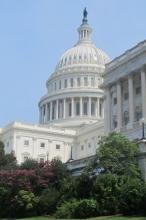A bill aimed at ending the practice of surprise billing, along with a number of other health care cost-containment measures, passed by an overwhelming majority during a mark-up session of the Senate Health, Education, Labor, and Pensions Committee.
S. 1895, the Lower Health Care Costs Act of 2019, passed 20-3; Sens. Rand Paul (R-Ky.), Bernie Sanders (D-Ver.) and Elizabeth Warren (D-Mass.) voted against it.
A summary of the bill’s provisions can be found here.
With Sen. Sanders and Sen. Warren not present, presumably out to prepare for the Democratic presidential nominee debates and voting by proxy, only Sen. Paul was present to speak against the bill. He questioned whether it would have any impact on lowering health care cost.
Among other provisions, the bill would ban all gag clauses that would keep pricing data from being released; all anticompetitive clauses in facility and insurance contracts that would otherwise limit access to higher-quality, lower-cost care; would designate a nongovernment entity focused on price transparency; and would improve the accuracy of directory information.
But government-induced transparency is not the solution, Sen. Paul said.
He called it a “fallacy” that “you can mandate transparency, and you’ll create a marketplace.” Rather, you need to create a marketplace, and transparency will naturally follow, he said.
Sen. Paul noted that just having institutions publishing prices that no one pays and prices that are not freely fluctuating “doesn’t work.”
“The irony here is that, when you have no insurance involved, you actually have a marketplace,” he said. “The people without insurance are the only true marketplace,” he said, adding that those with high deductibles would also fall into that category.
The crux of S. 1895 is protections to end so-called “surprise bills” that occur when patients receive medical services from out-of-network health care professionals at in-network hospitals. These out-of-network services are not constrained by prior agreements and can add up to tens of thousands of dollars.
“There are those who have seen the history of price controls and know that you never get what you intended,” he said, and predicted that this could lead to a shortage of physicians.
The American Medical Association also criticized the surprise billing provisions of the bill.
In a June 25 letter, the AMA noted that “the approach outlined in S. 1895 fails to address some of the fundamental reasons why surprise billing occurs – inadequate provider networks, higher patient-cost sharing requirements for out-of-network services, and noncompetitive local markets that empower plans to offer take-it-or-leave-it contracts.”
AMA also criticized the use of benchmark pricing to settle out-of-network billing issues. “By setting a payment maximum at the individual plans’ median in-network amount, insurers will have even less incentive to negotiate contracts with individual providers,” according to the letter. “They can drive down the median in-network amount by simply dropping from their networks providers who are currently paid above the median. Or, they can simply stop negotiating altogether, knowing that their financial obligation is limited to their own median in-network payment amounts.”
The Physicians Advocacy Institute agreed. In a June 26 statement, the organization stated that it remains “deeply concerned that arbitrary, government-set payment benchmarks championed by the health insurance industry will further undermine provider networks and devastate patients’ access to critical medical services.”
A collective of hospital organizations, including the Federation of American Hospitals and the American Hospital Association also opposed the use of benchmark pricing.
In a June 25 letter to committee leadership, the groups stated that they are “concerned that the rate-setting provision of the legislation is a plan-determined, nontransparent process that will upend private payment negotiation. A default rate will become the payment ceiling and remove incentives for insurers to develop comprehensive networks, as there are already increasing numbers of narrow network products offered that exclude certain types of providers.”
The bill also addresses the cost of prescription drugs, including providing clearer information about patents, ensuring a more timely access to generics, altering exclusivity rules to help get generics to market quicker, reporting requirements for price increases, and a number of other provisions aimed at increasing competition in an effort to lower drug pricing.
Other areas covered by the bill include more oversight of pharmacy benefit managers, strengthening parity in mental health laws, and a number of provisions aimed at public health and health information technology.


